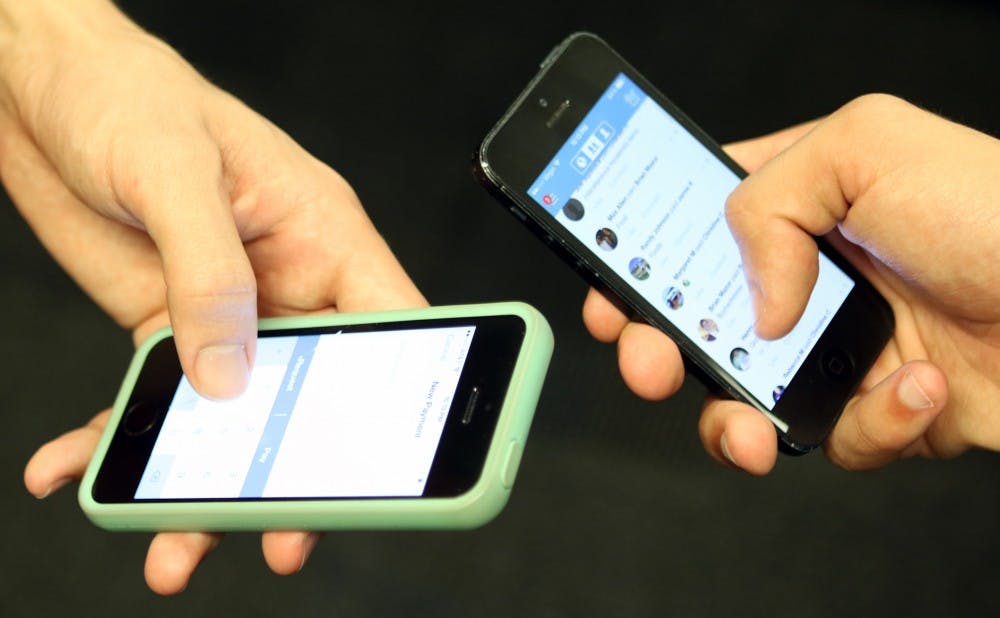Stressed by demanding workloads, job searches and social pressures, college students, including many of those on Duke’s campus, are vulnerable to deteriorating mental health. However, another major factor that seems to be exacerbating the issue is the ubiquitous obsession with social media.
A study published by the American Psychiatric Association in November of 2018 found that college students have increasingly utilized campus services to alleviate mental health issues over the last ten years. Rates of suicide and depression increased, as did lifetime diagnoses of a mental health condition.
Some evidence indicates that social media may be a key factor in increasing rates of depression. A University of Pennsylvania study found that, “limiting social media use to approximately 30 minutes per day may lead to significant improvement in well-being.”
According to Pew Research Center, 88 percent of 18 to 29-year-olds use some form of social media, outranking every other age demographic in terms of social media consumption. Snapchat is among the most popular platforms for teenagers and young adults. Seventy-eight percent of 18 to 24-year-olds reported using the app with 71 percent of them visiting it multiple times per day. In comparison, only 54 percent of 25 to 29-year-olds said they used Snapchat. As of October of 2018, the app had 186 million daily active users.
You don’t have to look at these numbers to know that Snapchat is beginning to dominate our lives. Go no farther than any Duke basketball game, fraternity party, or lunch with friends at the Brodhead Center to see students mesmerized by Snap stories and determined to send pictures via the app.
The unfortunate reality is that heavy use of social media, particularly Snapchat, has been linked to mental illness. The good news: some young people are starting to notice it.
A 2017 survey by the Royal Society for Public Health found that Britons ages 14-24 believe that social media outlets harm their wellbeing. Although citing positive effects of social media such as building self-identity and self-expression, many also said that platforms like Twitter, Instagram and Snapchat exacerbate anxiety, sleep deprivation and depression.
According to the survey, Snapchat in particular was noted to evoke a strong negative response when it comes to creating worries about fear of missing out, or FOMO. This makes sense given the amount of time many us spend looking at stories, which typically are videos and photos of our friends’ activities.
Sharing the fun parts of our day to friends may seem innocent; yet we all know the lonely and unhappy feeling we get seeing them have that fun without us. The image focus of Snapchat may also create feelings of inadequacy as it relates to how we look, reducing our self-confidence.
Even though each Snap is essentially a few seconds, we somehow find a way to spend on average 40 minutes a day using the app that could likely go toward more productive activities. Addiction to viewing Snapchat stories is not only time consuming, but also illogical. Why would we want to invest so much time wondering about what other people are up to? We should be prioritizing the events that are within our control that can contribute to productivity, higher self-esteem and in-person social interaction.
Snapchat stories, and even regular Snaps to some extent, depict a false reality. The purpose of the app is to record the events of your day and share it publicly to your friends. However, our ability to select specific moments of our day leads to bias in picking the best moments or moments that give off the best impression. Thus, when viewing Snaps and watching stories, we are often comparing ourselves to a misrepresentation of a friend’s life.
Unfortunately, we buy into the desire to feel adequate and raise our self-esteem, taking pictures and videos of every social gathering, party or large event in hopes of proving our social value to others. This is not an authentic way to build confidence. Rather, we should focus on being in the moment.
Think about it. You are so worried about showing people a moment and creating a certain perception of yourself that you don’t even fully live that moment. It’s ridiculous.
It is understandable to send pictures that are truly valuable for communicating with friends. However, it is important to take time to enjoy the presence of friends and family rather than be emotionally disconnected from the present trying to impress people absorbed in their own activities. Your life should focus on you, and not watching others live theirs only to feel left out. Cherish your experiences and avoid comparing your life to others, especially when you are receiving a misleading version of reality.
Our obsession with Snapchat undoubtedly can lead to unnecessary stress that has serious mental health implications. If you relate to this stress, the solution is simple. Delete the app.
Mitchell Siegel is a trinity junior. His column, Truth Be Told, runs on alternate Thursdays.
Get The Chronicle straight to your inbox
Sign up for our weekly newsletter. Cancel at any time.
Mitchell Siegel is a Trinity sophomore. His column, "truth be told," runs on alternate Wednesdays.

